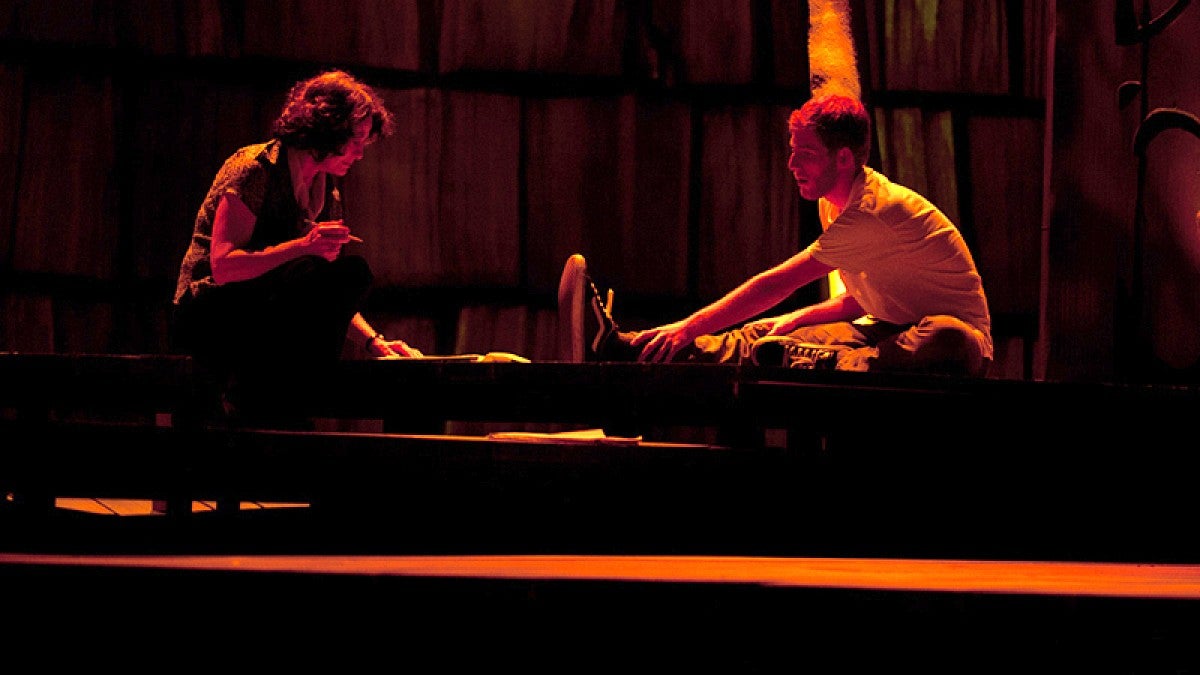Ever since she first saw artists using the stage to spark action on the big social and political issues of the day, Theresa May has been interested in the marriage of theater and activism.
Now a professor of theater arts at the UO, May is working on a new book exploring theater’s role in environmental issues over the last century. “Ecodramaturgy” looks at how performance art has shaped public understanding of the earth and its ecology over 10 decades.
“The stories that we tell matter,” May said. “Along with other arts, theater has not only reflected but influenced society’s understanding of environmental issues at both a local and national level. My book asks how theater has engaged some of the central environmental debates of the 20th century and how these stories have influenced our environmental values and actions.”
May’s central point is that theater has been intricately linked to many of the core ecological issues the U.S. has grappled with over the last hundred years. That theory stands in contrast to some scholarship suggesting theater is just starting to link itself to environmental issues.
“We’re seeing a contemporary movement to ‘green American theater’ as artists are asking how theater can start responding to environmental changes,” May said. “But my research shows that theater started responding to environmental debates and issues decades ago. A relationship with the land has always been present on stage, whether that’s through how it’s envisioned and represented or what that reveals about our values.”
May supports her idea by highlighting performances that have addressed ecological issues like the frontier and land management, the conservation and preservation movements, race, class, gender and environmental justice, and the recognition of climate change. For each one, she outlines how theater has been used to reflect certain sentiments and how it has shaped public dialogue on each subject.
For instance, in her chapter about how environmental issues have collided with social justice on stage, she points to the 1959 play “A Raisin in the Sun,” which tells the story of a black family and the environmental disparities they face through living in a neighborhood on the south side of Chicago.
“There’s been a disproportionate impact of environmental degradation on the poor, working class and urban communities of color, which plays like ‘A Raisin in the Sun’ help us see,” she said. “Theater is a pivotal site for telling the stories of communities who have lived and worked at the center of ecological impact.”
She said theater has, at times, promoted environmental degradation through ideas like manifest destiny. She said productions like “Oklahoma!” promote the industrialization of the American West, while “Power,” a state-sponsored performance from the New Deal era, advocates tapping into American rivers for hydroelectric power.
But she believes it’s vital to examine and dismantle the stories that have sanctioned environmental destruction, especially because some of those plays are still performed.
“The arts were part of the process from which the present global predicament arises,” May said. “And they have a vital role to play in envisioning a sustainable, just and humane future.”
This isn’t the first time May has tackled a project in the arena of arts and the environment. Before she started her career in academia she was the founding artistic director for a theater company in Seattle that brought environmental education to public schools through theatrical performances, to get children talking about issues like pollution, habitats, and natural and cultural history.
In 2004 May also co-founded Earth Matters on Stage, known as EMOS, a national organization that hosts an annual symposium to unite artists, activists, performers and scholars interested in the intersection of theater and the environment. It includes a concurrent festival and contest to encourage playwrights and artists to engage in ecological issues.
“Earth Matters on Stage looks for plays that enliven and transform our experience of the world around us, that inspire us to listen better and instill a deeper or more complex sense of our ecological communities, and that address issues of environmental justice,” May said.
She is hopeful that “Ecodramaturgy” will inspire more conversation and action by reminding artists, activists and community leaders that the arts have a rich history of making meaningful contributions toward ecological and cultural transformations.
“I hope this material and its examination of history leaves readers with reflective questions about the possibilities for theater as a catalyst for civic transformation,” May said. “The tools of theater-making provide potent means to write new stories, to tell undertold stories and to unravel those that have held sway for so long.”
—By Emily Halnon, University Communications


